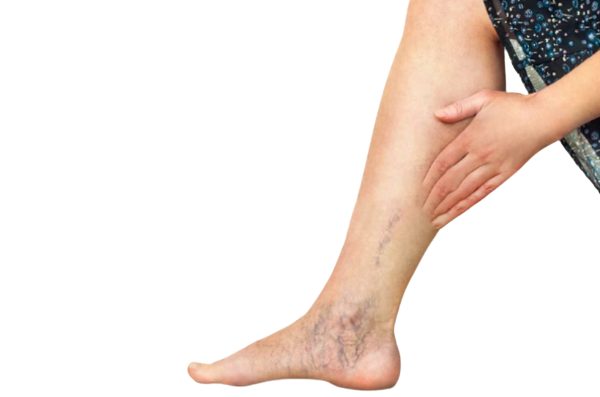Contact Us
Phone
+91 9654080222
contact@drdeependra.com
Location
Conexus Medical Centre
3rd Floor,
Raja Ram Kumar Plaza,
Hazratganj,
Lucknow
Latest Blogs
What is Varicose Veins Surgery ?
Varicose veins are a condition in which the veins are twisted and enlarged. Though any superficial vein can be varicose, the most commonly affected veins are those in the legs. This is because the pressure in the veins of the lower body increases while standing and walking.
What Are The Factors That Increase The Risk Of Developing A Varicose Vein?
The common risk factors that are involved in the development of varicose veins are:
-
Age - The valves in your veins that control blood flow wear off as a person gets older. As a result, the valves eventually allow some blood to flow back into the veins, where it gathers, rather than going up to the heart.
-
Pregnancy - The volume of blood in the body grows throughout pregnancy. This shift benefits the developing fetus, but it also has the unintended consequence of causing larger veins in the legs. Hormonal changes that occur during pregnancy may also be a factor.
-
Family history - If the patient has a family history of varicose veins, the chances of developing this condition is high.
-
Obesity – Added pressure on the veins due to obesity is another cause.
Though there are minimal complications associated with varicose veins, the following conditions can occur:
-
Ulcer - Near varicose veins, particularly near the ankles, painful ulcers can also occur on the skin. A discolored spot on the skin usually emerges before an ulcer develops.
-
Blood clot - Veins deep within the legs can expand sometimes. The damaged leg may enlarge and become unpleasant in such conditions. Any chronic leg discomfort or swelling should be checked by a doctor since it could be a sign of a blood clot, also known as thrombophlebitis.
-
Bleeding - Veins near the skin's surface have a tendency to burst.
How is a varicose vein treated with the help of surgery? Even after wearing compression stockings and taking proper self-care, if the condition becomes severe, then the Apollo doctor may suggest any of the following treatment methods:
-
Sclerotherapy – In this procedure, a solution or foam is injected into small and medium-sized varicose veins, scarring and closing them. Varicose veins that have been treated should fade in a few weeks. Sclerotherapy is effective if done correctly, even if the same vein needs to be injected multiple times. Sclerotherapy does not require anesthesia.
-
Foam sclerotherapy of large veins – Injecting a large vein with foam and closing the vein is also possible in this procedure.
-
Laser treatment – Smaller varicose veins and spider veins are being treated with modern laser technology by doctors. The laser treatment causes the vein to shrink and disintegrate over time by sending intense bursts of light at it. There are no incisions or needles involved in this procedure.
-
Catheter-assisted procedure – This procedure can be done using radiofrequency or laser energy. In one of these procedures, a thin tube (catheter) is inserted into an enlarged vein, and radiofrequency or laser radiation is used to heat the catheter's tip. The heat from the catheter will cause the vein to collapse, hence this procedure is the ideal option for larger varicose veins.
-
High ligation and vein stripping – This procedure is done by tying off a vein before it connects to a deep vein and then removing it using minor incisions. Larger amounts of blood are handled by veins deeper in the leg therefore, removing the vein will not prevent the blood from circulating.
-
Ambulatory phlebectomy – Smaller varicose veins are removed through a series of small punctures on the skin made by a doctor. Typically, this operation is done as an outpatient treatment.
-
Endoscopic vein surgery – This treatment is recommended only in severe leg ulcers, or if other treatments fail. The surgeon operates and closes varicose veins with a thin video camera inserted into the leg, and removes the veins through small incisions.
What can you expect during post-surgical care for varicose veins surgery?
After the surgery the patient is taken to the general ward. Based on the surgeon’s recommendation, the patient can go home in 1 to 2 hours after surgery.
-
Exercising regularly
-
Maintaining a healthy diet and watching the weight
-
Avoid wearing heels
-
Keep your legs elevated
-
Avoid sitting or standing for a long time.
Facilities at CMC
Established By Dr Deependra In 2022, CMC Healthcare Has A Robust Presence Across The Healthcare Ecosystem


Specialised Service
We have Specialist Team

24/7 Advanced Care
Always Ready For You

Get Result Online
Get Your Report Online
How To Take care of Your Heart
Dr. Deependra Pandey is among the Best Cardiologist in Lucknow, he says when your heart isn’t given the attention it requires, major issues with the lining of the arteries may arise, which subsequently cause plaque to form. Heart attacks and artery blood flow obstruction are caused by plaque.
DR. DEEPENDRA PANDEY
MD Ph.D
(Cardiovascular
Surgery),
Bakulev Institute Of Cardio-Vascular Surgery, Moscow
Readmore






